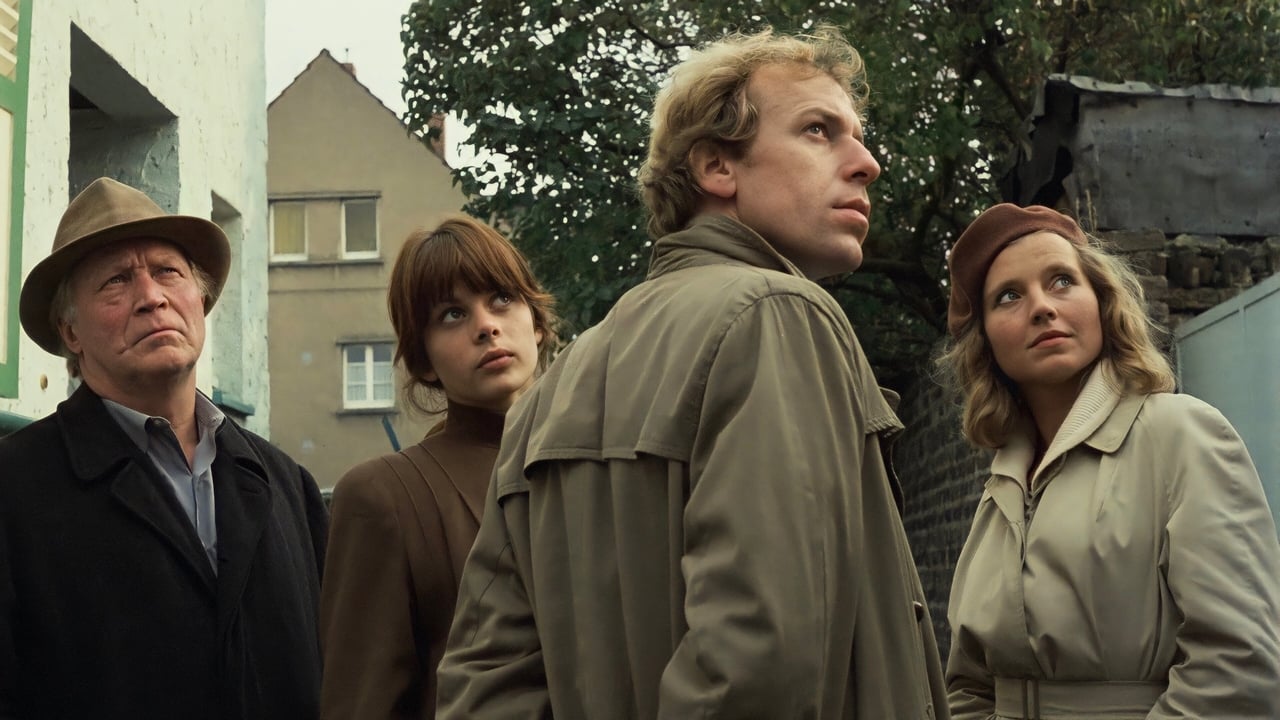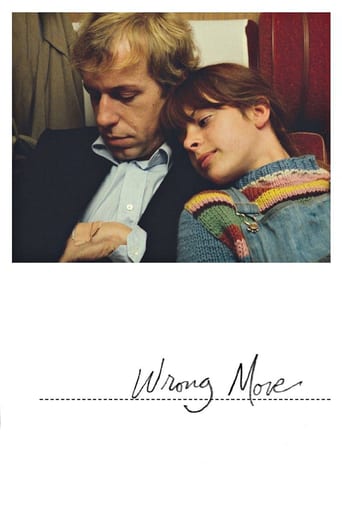

I wanted to like it more than I actually did... But much of the humor totally escaped me and I walked out only mildly impressed.
... View MoreEach character in this movie — down to the smallest one — is an individual rather than a type, prone to spontaneous changes of mood and sometimes amusing outbursts of pettiness or ill humor.
... View MoreLet me be very fair here, this is not the best movie in my opinion. But, this movie is fun, it has purpose and is very enjoyable to watch.
... View MoreIt's simply great fun, a winsome film and an occasionally over-the-top luxury fantasy that never flags.
... View MoreWim Wenders and writer Peter Handke team up a decade before "Berurin Tenshi no Uta" Wings of desire (1987)(Ailes du desir) and 4 decades before The Beautiful Days of Aranjuez (2016) based on Peter's play in French to premiere at Cannes this month.It is shorter and simpler than Wings of Desire and it feels as though the whole movie is almost one take, one moment, one long reflection on the same theme of loss and loneliness, perhaps longing and love. It is poetic and philosophical, but also human. It succeeds in asking tough questions and not given easy answers. It understands human complexity and perhaps perplexity facing an uncontrollable, sometimes unsatisfying life.Momentary solace and camaraderie soon dissolves as things fall apart naturally, casually and necessarily. Much more down to Earth than somehow esoteric Wings of Desire and has a direct impact on the viewer even if often dark and detached beyond the light-hearted and hypnotic beginning. A interesting find, and perhaps one of the best movies of 1975, winning 6 German Film Awards including a deserving best direction, best screenplay and best cinematography by Robby Müller who shines on various occasion and gives a cohesive visual feel. I will look up Alice in the Cities (1974) and Kings of the Road (1976) to see see if Wender achieved similar success. Let's hope Peter Handke again gives substance to Wim Wenders now that Wenders is tackling 3 fiction films in a row after dedicating a decade and a half to creating captivating documentaries starting with Oscar-nominated Buena Vista Social Club (1999) and even better recent offerings Pina (2011) and The Salt of the Earth (2014).
... View More"Falsche Bewegung" or "False Movement" is a German film from slightly over 40 years ago written and directed by Wim Wenders. The main character is player by Rüdiger Vogler and just like him there are several actors and crew members in here that Wenders worked with in more movies before and after this one. Being a fan of the duo's collaboration on "Alice in the Cities", I must say I was a bit disappointed here. In my opinion, Vogler is not really one who can play aggressive characters very impressively, like for example Brauss in "Die Angst des Tormanns beim Elfmeter". That's why I felt that the final scene did not appear very realistic.The atmosphere and tone is similar to other movies by the filmmaker behind this one here. It is the depiction of life in a realistic manner with rarely something happening that is out of the ordinary. And I felt that this film dragged more than other Wenders films. Yes there were also some good moments occasionally and the acting is pretty convincing most of the time too, but as a whole it did not feel sufficient for a film that runs for almost 100 minutes, even if that is certainly among Wenders' shortest full feature films. All in all, I do not recommend the watch or at least not as one of the first choices if you are interested in getting into Wenders' body of work. Check out some of the other films I mentioned in this review here too. As for "Falsche Bewegung", I give it a thumbs-down.
... View MoreI've noticed that many reviews about "art films" are written by people who have already decided to like them. This is the only way for me to explain why so many uninspired films are unavoidably hailed as master pieces - maybe it is because of the "artistic patina" that covers them, and Wim Wenders, after all, has got himself a name.For me it's a very simple question: Did I like the film? It doesn't matter who directed it, or anything like it. Well, I THINK didn't like the film. Why? I'll try to answer it."Falsche Bewegung" is based freely on Goethe's "Wilhelm Meisters Lehrjahre" (another reason why "art film" buffs SHOULD like this film). Wilhelm is tired of life and wants to become a writer. He leaves his mother and starts on a self-discovery journey. On the train, he meets an old athlete of the 1936 Berlin Olympic Games and his assistant Mignon, a mute acrobat (lovely Natassja Kinky). During a train stop he sees a woman staring out of a window of another train, Therese (Hanna Schygulla). In a road house they will know an amateur metaphysical poet. And these characters will unite and travel together searching for the meaning of life - reflexions on politics, the meaning of life, love, the need for action, metaphysical poetry... but no emotional links are established among the characters. Maybe it is because this film is seen through Wilhelm's eyes and all he really wants is to write a book.The film floats in emptiness - what moves the characters and makes them stick together remains a mystery - after many deep conversations, melancholy, and nothing else, I was really tired, and I almost decided to call it a day. But I gritted my teeth and watched the film to the end.When the film ends, the group has disbanded, each goes his/her own ways and Wilhelm is left alone brooding that he had made again "the wrong move", because he couldn't establish any emotional links with anyone. Emptiness, grey skies, hopelessness...Now, beware you "art film" buff - if you want to compare Wim Wenders with Antonioni or Bergman, you're on the wrong track. In Antonioni or Bergmans films, there's is loneliness and alienation, all right, but their films portray deep emotional troubles that come from human relationships, while this film, in particular, shows nothing at all, just emptiness followed by empty words. Nothing plus nothing equals nothing.
... View MoreWhile it may be cliche to say that The Wrong Move is director Wenders' self-portrait, his sense-of-lost in contemporary Germany will be easily trailed through writer-wannabe protagonist Wilhelm's fruitless journey to encounter and interact with new lover, friend and enemy. Cinematographer Robby Muller, who would be internationally acclaimed a few years later, is on his way, exploring amazing long takes in the conversation-while-walking scene towards the end. European contemporary classical soundtrack sounds appropriate but obsolete.
... View More